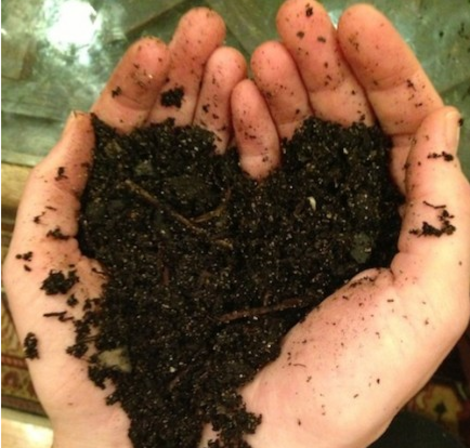Nature’s Ritalin: 7 Studies Show Why Time Outdoors Makes for Higher-Functioning Kids

Let's be clear: We like screens.
Our kids watch TV, we love educational and creative apps, and totally see the cognitive benefits of screen time for the Touch-Screen Generation. But there are also impressive-stunning, really-intellectual and emotional benefits to being outside, for both kids and adults, and we want to lay them out for you.
A little background: Growing food, and generally working outdoors with her hands in the earth, saved Jeanne's life. Literally. She tells the story in her book, From The Ground Up: A Food-Grower's Education in Life, Love and the Movement that's Changing the Nation (which was released this week! And is getting nice reviews!). Growing up in the suburbs of Chicago, at the height of '80s materialism, Jeanne spiraled into a depression and at the age of 18 sought out nature as a cure. She spent the next 17 years growing food on rural farms, and then returned home to Chicago with her young daughter. She has since created more than 650 food gardens and farms in and around the city, in places as varied as restaurant rooftops, inner-city shelters, suburban estates, and the mayor's back yard.
When researching her book, we found study after study investigating the influence of nature on the mind-studies that helped Jeanne understand the mysterious force that first drew her from suburbia into the natural world, and then compelled her to build lush, natural spaces in the city. We recently found this jaw-dropping article in Outside by Florence Williams, "Take Two Hours of Pine Forest and Call Me in the Morning," with fascinating new insights into nature's impact on the brain.
Related: The 7 habits of highly effective kids
We've gathered seven of the most notable studies from the book and from Williams' article about the radical benefits of spending time outdoors-showing why it makes people not just calmer and happier, but also more focused, disciplined, healthy, social, and creative:
1. Inner Calm
Japanese scientists Yoshifumi Miyazaki and Juyoung Lee have taken more than 600 subjects into the woods since 2004 to study "forest therapy." They have found that "leisurely forest walks, compared with urban walks, yield a 12.4 percent decrease in the stress hormone cortisol, a seven percent decrease in sympathetic nerve activity, a 1.4 percent decrease in blood pressure, and a 5.8 percent decrease in heart rate," reports Williams.
2. Creativity
"A recent pilot study by psychologists Paul and Ruth Ann Atchley of the University of Kansas and David Strayer of the University of Utah found that after three days of hiking and camping in the wilderness, participants in an Outward Bound course improved their scores on tests of creativity by 50 percent," Williams reports.
3. Health
Qing Li from the Nippon Medical School in Tokyo found that time spent outdoors may boost our immune systems. A person's "natural killer" immune cells (called "NK" cells) attack tumors and virus-infected cells. Li brought a group of city slickers into the woods to hike for three days, after which their blood tests showed an amazing 40 percent jump in their NK cells. But when these same subjects walked around the city, their NK levels didn't budge.
4. Focus
Attention Deficit Disorder affects one in fourteen children in the US. One recent study by the University of Illinois at Urbana-Champaign explored how gardening and other outdoor activities influenced the behavior of more than four hundred kids nationally, aged five to eighteen, diagnosed with ADHD. It found that these activities reduced "impulsivity" and "inattention," among other symptoms of ADHD, by a "significant or marginally significant" measure. Frances E. Kuo, a coauthor of the study, concluded that nature offers "a way to help manage ADHD symptoms that is readily available, doesn't have any stigma associated with it, doesn't cost anything, and doesn't have any side effects."
5. Friendship
Frances Kuo of University of Illinois U-C did another study concluding that nature improves social relationships: "In greener settings - rooms, buildings, neighborhoods, and larger areas with more vegetation, we find that people are more generous and more desirous of connections with others," she wrote. "We find stronger neighborhood social ties and greater sense of community, more mutual trust and willingness to help others; and we find evidence of healthier social functioning in neighborhood common spaces."
6. Happiness
Dirt makes you feel good-literally. Soil on your skin boosts serotonin. A study from The University of Bristol in England in 2007 showed that when injected in mice, a specific soil bacterium called Mycobacterium vaccae, targets immune cells which release chemicals that stimulate the serotonin-releasing neurons in the brain-the very same neurons activated by Prozac.
7. Self-control
Stephen and Rachel Kaplan, professors of psychology at the University of Michigan have spent decades researching the attention restoration theory, which holds that humans concentrate better after spending time in nature. The Kaplans distinguish between voluntary attention, when a person must actively focus to solve problems, and involuntary attention, when a person's focus is effortlessly engaged by the surroundings. Nature, with its varieties of sound, smell, and texture, has the unique power to highly engage a person's involuntary attention, which, in turn, rests and restores the person's ability to exert voluntary attention. It's this control over voluntary attention that helps kids thrive in school and relationships.
- By Jeanne Nolan and Amanda Little
For the top 10 chemically treated fruits and veggies NOT to feed your kids, visit
MORE ON BABBLE
7 things you should NEVER say to your kids
25 outdoor activities that are more fun than video games
12 things your kids MUST see you do

